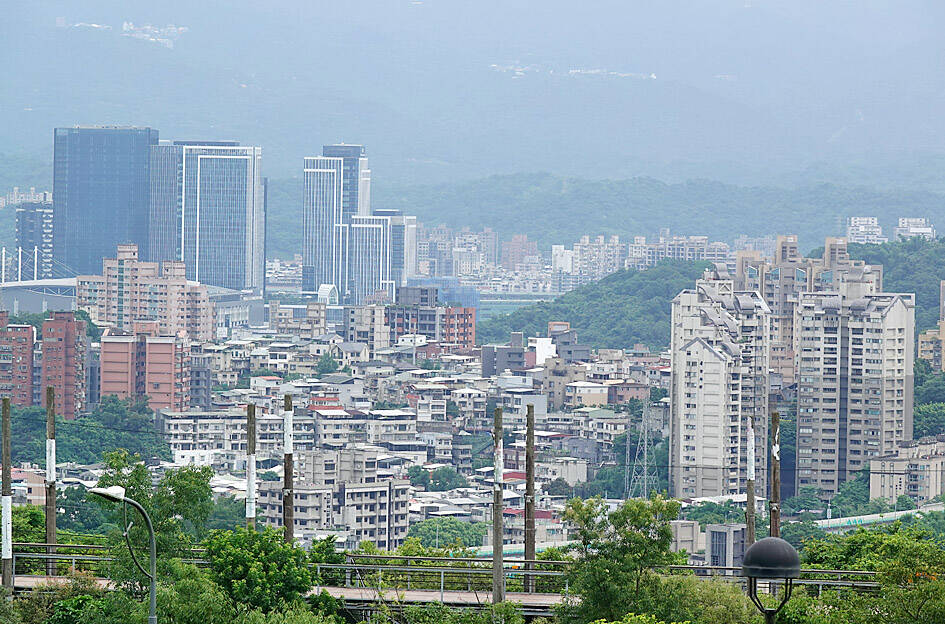The Ministry of Finance and state-run lenders are discussing measures to crack down on property speculation and the misuse of favorable lending terms intended for first-time home buyers and self-occupancy.
The ministry on Monday exchanged views with ranking officials from eight state-run banks. They are to meet again today to establish rules to prevent abuse of the stimulus program.
In August last year, the ministry refined its preferential program that offers people buying their first home a favorable interest rate of 1.775 percent, a five-year grace period and mortgages for up to 40 years. The interest subsidy lasts for three years for mortgages capped at NT$12 million (US$370,405).

Photo: CNA
The program has since helped the housing market emerge from a slowdown induced by the government’s selective credit controls, interest rate hikes, tightened income taxes on short-term property transactions and a ban on transfers of presale house purchase agreements.
Minister of Finance Chuang Tsui-yun (莊翠雲) on Monday reportedly urged state-run lenders to tighten reviews of mortgage applications to root out dummy buyers and request affidavits stating that those taking out a loan would not lease their house or use it for investment purposes.
Those found to have misused the program would have their favorable lending terms revoked and would have to return the interest subsidy, people from the state-run lenders said, adding that interest rates vary for borrowers depending on their credit profile.
Critics of the program say housing prices have increased at a rate that outweighs the benefits of the stimulus, and buyers, especially young people, could find it difficult to shoulder their mortgage once the interest subsidy and grace period expire.
Premier Cho Jung-tai (卓榮泰) yesterday said that the Executive Yuan would conduct a thorough review of the program next week.
For a mortgage of NT$10 million, monthly payments amount to NT$31,983 under favorable lending terms, H&B Business Group (住商不動產) research head Jessica Hsu (徐佳馨) said.
The monthly payment would rise by NT$2,101 without the interest subsidy, a sizeable increase for average borrowers, Hsu said.
The average price of houses assessed by banks nationwide climbed to a new high of NT$13.55 million in the first quarter, suggesting a spike of NT$2.35 million from 2019, Chinatrust Real Estate Co (中信房屋) said yesterday, citing data from the Joint Credit Information Center (金融聯合徵信中心).
Kaohsiung reported the steepest advance of 30.1 percent, followed by Taoyuan’s 30 percent, as the two administrations have improved their infrastructure, Chinatrust said.
Kaohsiung reported largest number of home deals under NT$12 million between August last year and this month, as major tech firms are building new plants in the southern city, Great Home Realty Co (大家房屋) said.

Intel Corp chief executive officer Lip-Bu Tan (陳立武) is expected to meet with Taiwanese suppliers next month in conjunction with the opening of the Computex Taipei trade show, supply chain sources said on Monday. The visit, the first for Tan to Taiwan since assuming his new post last month, would be aimed at enhancing Intel’s ties with suppliers in Taiwan as he attempts to help turn around the struggling US chipmaker, the sources said. Tan is to hold a banquet to celebrate Intel’s 40-year presence in Taiwan before Computex opens on May 20 and invite dozens of Taiwanese suppliers to exchange views

Application-specific integrated circuit designer Faraday Technology Corp (智原) yesterday said that although revenue this quarter would decline 30 percent from last quarter, it retained its full-year forecast of revenue growth of 100 percent. The company attributed the quarterly drop to a slowdown in customers’ production of chips using Faraday’s advanced packaging technology. The company is still confident about its revenue growth this year, given its strong “design-win” — or the projects it won to help customers design their chips, Faraday president Steve Wang (王國雍) told an online earnings conference. “The design-win this year is better than we expected. We believe we will win

Chizuko Kimura has become the first female sushi chef in the world to win a Michelin star, fulfilling a promise she made to her dying husband to continue his legacy. The 54-year-old Japanese chef regained the Michelin star her late husband, Shunei Kimura, won three years ago for their Sushi Shunei restaurant in Paris. For Shunei Kimura, the star was a dream come true. However, the joy was short-lived. He died from cancer just three months later in June 2022. He was 65. The following year, the restaurant in the heart of Montmartre lost its star rating. Chizuko Kimura insisted that the new star is still down

While China’s leaders use their economic and political might to fight US President Donald Trump’s trade war “to the end,” its army of social media soldiers are embarking on a more humorous campaign online. Trump’s tariff blitz has seen Washington and Beijing impose eye-watering duties on imports from the other, fanning a standoff between the economic superpowers that has sparked global recession fears and sent markets into a tailspin. Trump says his policy is a response to years of being “ripped off” by other countries and aims to bring manufacturing to the US, forcing companies to employ US workers. However, China’s online warriors